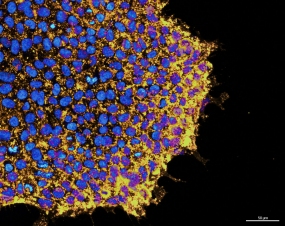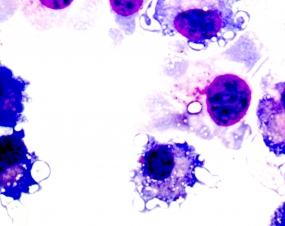Research Projects in the Clinical Cooperation Unit Dermato-Oncology
1. Translational melanoma research (Prof. Dr. M. Gaiser, Prof. Dr. J. Utikal)
The Clinical Cooperation Unit Dermato-Oncology conducts several translational research projects including different Phase I - IV clinical trials with innovative melanoma therapies.
2. Biomarkers in melanoma (Prof. Dr. M. Gaiser, Prof. Dr. V. Umansky, Prof. Dr. J. Utikal)
Based on a bio-databank that includes human melanoma serum/ plasma/ PBMCs and tissue specimens as well as clinical data we are currently looking for new biomarkers that predict disease progression (even subclinically), response to therapies and clinical outcome.
3. Plasticity of melanoma cells (Prof. Dr. J. Utikal)

Human induced pluripoptent stem cells (iPS cells) (SSEA7 staining)
© dkfz.de
Embryonic stem cells and tumor cells have many aspects in common including an immortal cell growth and the potential of forming tumors. Primary cells like melanocytes can be converted through transient ectopic expression of different sets of transcription factors into pluripotent embryonic stem-like cells. Tumorigenesis and the nuclear reprogramming by these transcription factors rely on overlapping mechanisms such as overexpression of oncogenes and disruption of tumor suppressor genes. Furthermore, melanoma cells can be transformed via ectopic expression of these transcription factors into a pluripotent state. The mechanism behind this plasticity and stem cell properties of melanoma cells are being studied.
In addition, we are studying the mechanisms of pluripotent stem cell differentiation into melanocytes and keratinocytes.
4. Immunosuppression in melanoma (Prof. Dr. V. Umansky)

Myeloid-derived suppressor cells (MDSCs)
© dkfz.de
Immunogenic capacities of melanoma cells should allow a successful application of different immunotherapeutic strategies. However, the overall results of immunotherapeutic clinical studies are not satisfactory. These paradoxical observations are thought to be due to the profound immunosuppression mediated by tumor and surrounding stroma cells. Melanoma microenvironment has been characterized by an accumulation of highly immunosuppressive regulatory leukocytes, in particular, myeloid-derived suppressor cells (MDSC). Their migration, retention and high activity in tumor lesions is induced by chronic inflammatory conditions developing in the tumor microenvironment and characterized by the long-term secretion of inflammatory mediators leading to further cancer progression. Based on the ret transgenic mouse model of spontaneous melanoma that resembles human melanoma, we study molecular mechanisms of immunosuppression induced by MDSC and regulatory T cells (Treg) and different inhibitors of their suppressive activity aiming to develop a new strategy of melanoma therapy that includes the neutralization of immunosuppression and chronic inflammation in the tumor microenvironment. Since we found that functionally active melanoma-specific memory T cells and tumor cells accumulate in the bone marrow early in melanoma development we investigate their interactions and the reaction of the immune system towards the plasticity of different melanoma subpopulations. MDSCs and Treg are also tested in melanoma patients in different clinical trials.
